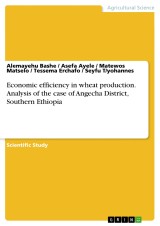Details

Economic efficiency in wheat production. Analysis of the case of Angecha District, Southern Ethiopia
1. Auflage
|
13,99 € |
|
| Verlag: | Grin Verlag |
| Format: | |
| Veröffentl.: | 26.01.2023 |
| ISBN/EAN: | 9783346801999 |
| Sprache: | englisch |
| Anzahl Seiten: | 17 |
Dieses eBook erhalten Sie ohne Kopierschutz.
Beschreibungen
Scientific Study from the year 2023 in the subject Agrarian Studies, , course: Agricultural Economics research, language: English, abstract: Production improvement through the use of improved technologies and increasing efficiency of inputs in cereal production in general and wheat production in particular might be an important alternative to settle food security problem in Ethiopia. Wheat is the first cash crop produced in Angecha District, kembata Tambaro zone, with a total area covered of 4567.5ha. But, the efficiency of producers that they could not use available resources on hand was taken as a great attention.
So this study was aimed to analyze the levels of technical, allocative and economic efficiencies of wheat producers; and determining factors for inefficiency in farmers’ wheat production by using cross sectional data from randomly selected 123 households in 2018/19 production year.
The study used both primary and secondary data sources and stochastic production frontier approach was used to estimate the level of efficiencies. Ordinary least square estimation was used to identify factors that affect inefficiencies of sample farmers’ in study area. The regression model result indicated that input variables like land and seed were the significant variables to increase the yield of wheat output. 55.63%, 55.47% and 30.85% were the estimated mean values of technical, allocative and economic efficiencies respectively, which indicate the presence of inefficiency in wheat production in the study area.
Model result indicated that technical inefficiency positively and significantly affected by sex of the household head, and negatively affected by age, farm experience, land fragmentation, credit access and total livestock unit. Similarly, allocative inefficiency positively and significantly affected by sex and negatively by credit access and total livestock holdings. In addition, economic inefficiency negatively and significantly affected by credit access and total livestock holdings.
The policy measures implied from the results include: working further for quality seed and sustainable land management, expansion of gender sensitive and youth based strengthening of the extension services and trainings, strengthening the existing credit institutions services, and expansion of new livestock technologies in the study area.
So this study was aimed to analyze the levels of technical, allocative and economic efficiencies of wheat producers; and determining factors for inefficiency in farmers’ wheat production by using cross sectional data from randomly selected 123 households in 2018/19 production year.
The study used both primary and secondary data sources and stochastic production frontier approach was used to estimate the level of efficiencies. Ordinary least square estimation was used to identify factors that affect inefficiencies of sample farmers’ in study area. The regression model result indicated that input variables like land and seed were the significant variables to increase the yield of wheat output. 55.63%, 55.47% and 30.85% were the estimated mean values of technical, allocative and economic efficiencies respectively, which indicate the presence of inefficiency in wheat production in the study area.
Model result indicated that technical inefficiency positively and significantly affected by sex of the household head, and negatively affected by age, farm experience, land fragmentation, credit access and total livestock unit. Similarly, allocative inefficiency positively and significantly affected by sex and negatively by credit access and total livestock holdings. In addition, economic inefficiency negatively and significantly affected by credit access and total livestock holdings.
The policy measures implied from the results include: working further for quality seed and sustainable land management, expansion of gender sensitive and youth based strengthening of the extension services and trainings, strengthening the existing credit institutions services, and expansion of new livestock technologies in the study area.
Diese Produkte könnten Sie auch interessieren:

Agricultural Biodiversity and Biotechnology in Economic Development

von: Joseph Cooper, Leslie Lipper, David Zilberman

213,99 €

Policy Reforms and Agriculture Development in Central Asia

von: Sandjar Djalalov, Suresh Chandra Babu

213,99 €

Regulating Agricultural Biotechnology

von: Richard E. Just, Julian M. Alston, David Zilberman

213,99 €













